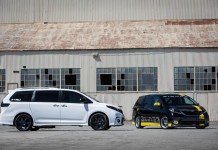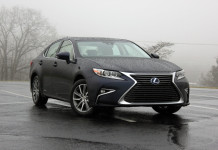Toyota Motor scrambled to reassure customers Tuesday that it has not sacrificed its legendary safety to be world number one as its recalls spread to the Middle East, Africa and Latin America.
The company has actively expanded overseas over the past decade to meet brisk demand for its cars, prompting critics to question whether its quality control has weakened in the process — a suggestion the group denies.
“I do not think that the expansion of the production overseas has affected the quality,” Toyota vice president Shinichi Sasaki told a news conference, at which he issued a fresh apology by the company for the massive recall.
“We have full trust in engineering and quality,” added Sasaki, the first Toyota executive to talk publicly in Japan about the recalls since they spread around the world last week.
Toyota said Tuesday that it would recall about 180,000 vehicles in the Middle East, Africa and Latin America that were imported from the United States with sticking accelerator pedals.
On Monday the company said it had started shipping parts to US dealers to repair the millions of vehicles recalled due to the problem pedal.
A “spacer” will be added to the pedal mechanism in order to increase the tension in a spring and reduce the risk of the pedal staying down.
The Japanese giant said it would resume production of the eight affected models on February 8 at factories in North America and resume sales after dealers have fixed the vehicles on their lots.
Toyota shares jumped 4.5 percent to 3,605 yen, recovering some of their recent heavy losses, as investors welcomed news that the company had found a remedy.
The automaker pulled up to 1.8 million vehicles in Europe on Friday, the latest in a series of recalls that has affected almost eight million Toyota cars worldwide — roughly equivalent to its entire 2009 global sales.
Along with the sticking pedals, the group is recalling almost 5.3 million US vehicles to replace floor mats that could trap accelerator pedals.
Related article: Recall forces US supplier into defense
The company is still unsure what the financial impact of the recalls will be for the automaker, Sasaki said.
“The cost is going to be high but we needed to do this,” he said. “Before we worry about the impact, we should worry about the customers and the dealers.”
Toyota, which overtook General Motors in 2008 as the top-selling automaker, has been hit by a series of safety issues that have dented its coveted reputation as a producer of safe and reliable vehicles. Related article: Toyota draws flak over recall PR strategy
Toyota president Akio Toyoda, the grandson of the company’s founder, has kept a low profile since the recall went global last week, and he did not appear at Tuesday’s news conference.
Related article: Toyota recall tests family scion’s mettle
When he was eventually tracked down by a Japanese television crew at the Davos economic forum over the weekend, he briefly apologised, saying the group was “extremely sorry to have made customers feel uneasy”.
The Japanese giant is facing criticism that it failed to communicate adequately with customers. It took more than a week for the company to outline a repair programme after the recall was first announced.
“We gave priority to properly issuing a warning, even at risk of causing confusion,” said Sasaki. “I apologise from the management for the delay and I hope you understand the situation.”
The company said that in rare cases, the accelerator pedal mechanism could become worn and harder to depress, or get stuck in a partially depressed position.








